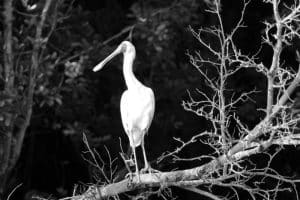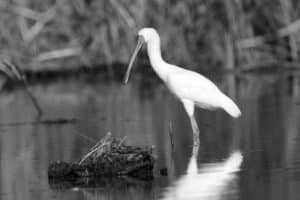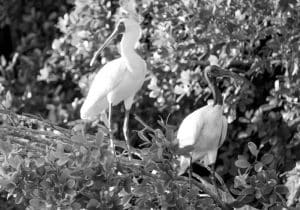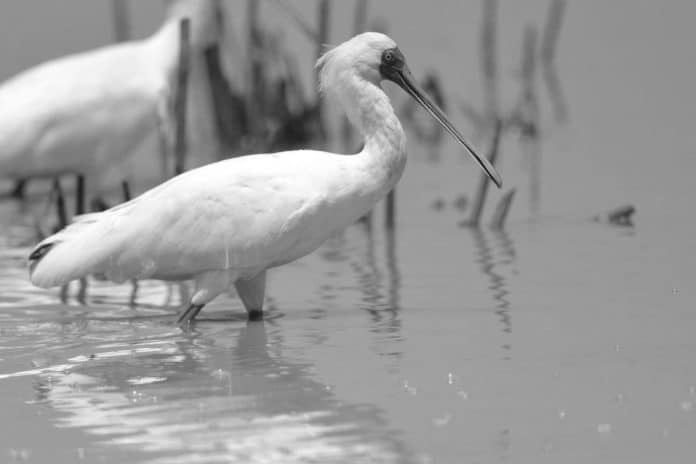Introduction to Spoonbills in Tanzania
Tanzania, a land of breathtaking landscapes and diverse wildlife, is a haven for nature enthusiasts. Among its many treasures, the majestic spoonbills stand out as a symbol of grace and grandeur. As a wildlife enthusiast, you are in for a delightful experience as you embark on a journey to discover the beauty of spoonbills in Tanzania. In this article, we will delve into the habitat, behavior, conservation efforts, best spots for sighting, guided tours, ecological importance, photography tips, sustainable tourism, and local community involvement related to spoonbills in Tanzania. Get ready to be captivated by the enchanting world of these magnificent birds and the efforts to preserve their natural habitat.
The Habitat and Behavior of Spoonbills

Tanzania’s diverse ecosystems provide a rich tapestry for spoonbills to thrive. These elegant birds are often found in wetlands, marshes, and shallow waters, where they can be seen wading gracefully as they forage for food. Spoonbills are known for their unique spoon-shaped bills, which they use to sweep through the water, catching small fish, crustaceans, and insects. Their striking white plumage with hints of pink on the wings and the distinct spoon-shaped bill make them a sight to behold in the wild.
Spoonbills are social creatures and are often found in colonies, where they engage in various displays and interactions. During the breeding season, their behaviors become even more fascinating, as they engage in elaborate courtship rituals and nest-building activities. Observing these birds in their natural habitat provides a rare insight into their intricate social dynamics and the delicate balance of life in the wetlands of Tanzania.
The serene and picturesque landscapes of Tanzania serve as the perfect backdrop for experiencing the natural behaviors of spoonbills. Whether you are exploring the shores of Lake Manyara or the lush wetlands of the Selous Game Reserve, you are sure to be mesmerized by the enchanting presence of these magnificent birds.
Conservation Efforts for Spoonbills in Tanzania
As with many species around the world, spoonbills face various threats to their survival, including habitat loss, pollution, and human disturbances. In Tanzania, concerted efforts are being made to conserve the habitats that are crucial for the well-being of spoonbills and other wetland species. Organizations and conservation groups are working tirelessly to protect the wetlands, raise awareness about the importance of these ecosystems, and advocate for sustainable practices to safeguard the future of spoonbills in Tanzania.
One of the key conservation initiatives focuses on monitoring and protecting the nesting sites of spoonbills. By understanding their breeding behaviors and habitat requirements, conservationists can implement targeted strategies to ensure the safety and productivity of these vital breeding grounds. Additionally, efforts to mitigate human impacts, such as minimizing disturbances from recreational activities and promoting responsible tourism practices, play a crucial role in protecting the natural habitats of spoonbills.
Collaboration with local communities is also integral to the success of conservation efforts. By involving communities in the stewardship of their natural surroundings, conservationists are able to foster a sense of ownership and responsibility, leading to sustainable coexistence between humans and wildlife. Through education, outreach programs, and livelihood initiatives, local residents are empowered to become ambassadors for the protection of spoonbills and their habitats.
The conservation of spoonbills in Tanzania is a testament to the collective dedication towards preserving the rich biodiversity of the region. By supporting these efforts, you can contribute to the safeguarding of these magnificent birds and the invaluable ecosystems they inhabit.
Best Places to Spot Spoonbills in Tanzania
Tanzania boasts a wealth of pristine habitats that offer unparalleled opportunities for spotting spoonbills in their natural environment. From the iconic Serengeti plains to the lesser-known gems of the southern wetlands, there are several locations that stand out as prime destinations for encountering these elegant birds.
Lake Manyara National Park, with its picturesque lake and diverse birdlife, is renowned for its abundant populations of spoonbills. As you navigate the tranquil waters or explore the surrounding woodlands, keep a keen eye out for the distinctive silhouette of spoonbills as they gracefully forage along the shores.
The Selous Game Reserve, a UNESCO World Heritage Site, is another hotspot for birdwatching, with its expansive wetlands and riverine habitats providing a haven for a myriad of bird species, including spoonbills. Embark on a river safari or a walking safari to immerse yourself in the natural rhythms of this untamed wilderness and witness the captivating beauty of spoonbills in their element.
For a more off-the-beaten-path experience, the lesser-known wetlands of the Western Circuit offer a sense of tranquility and seclusion, where you can observe spoonbills against the backdrop of unspoiled landscapes. The remote beauty of these regions provides a unique opportunity to connect with nature and witness the unfiltered grace of spoonbills in their pristine habitats.
Wherever your journey takes you in Tanzania, the allure of encountering spoonbills in the wild is an experience that will undoubtedly leave a lasting impression and create cherished memories of your wildlife adventures.
Guided Tours and Wildlife Safaris for Spoonbill Enthusiasts
Embarking on a guided tour or wildlife safari is an excellent way to enhance your exploration of the spoonbill habitats in Tanzania. Experienced guides and naturalists offer invaluable insights into the behaviors, ecology, and conservation significance of these remarkable birds, ensuring a fulfilling and educational experience for wildlife enthusiasts.
Many tour operators and lodges in Tanzania specialize in birdwatching excursions, including dedicated spoonbill safaris that cater to the interests of avid birdwatchers. These specialized tours are designed to optimize the chances of encountering spoonbills and other wetland species, providing opportunities for in-depth observations and photography.
In addition to birdwatching, guided tours often include immersive experiences such as nature walks, boat safaris, and cultural interactions, allowing you to gain a comprehensive understanding of the interconnectedness of the natural world and the human communities that coexist within these landscapes. Engaging with local guides and experts fosters a deeper appreciation for the intricate ecosystems that support the lives of spoonbills and the myriad of other wildlife species in Tanzania.
When selecting a guided tour or wildlife safari, consider choosing operators that prioritize sustainable practices and ethical wildlife viewing. By supporting responsible tourism initiatives, you can contribute to the conservation of spoonbills and their habitats while enjoying a memorable and enriching journey through the wilds of Tanzania.
The Ecological Importance of Spoonbills in Tanzania

Spoonbills play a vital role in the ecological balance of Tanzania’s wetlands, contributing to the health and resilience of these diverse ecosystems. As adept predators of small aquatic creatures, including fish, crustaceans, and insects, spoonbills help regulate the populations of their prey species, preventing imbalances that could impact the overall ecological integrity of the wetlands.
Furthermore, the foraging activities of spoonbills disturb the sediments in the water, promoting aeration and nutrient cycling that benefits the aquatic habitat as a whole. By stirring up the substrate with their bills, spoonbills inadvertently create opportunities for the growth of aquatic plants, algae, and invertebrates, which in turn support a web of life that sustains a multitude of other species within the wetland food web.
The presence of spoonbills in Tanzania’s wetlands also serves as a barometer for the health of these fragile ecosystems. Their reliance on specific habitat features and water quality standards makes them indicators of environmental quality, enabling conservationists to assess the overall well-being of the wetlands and advocate for measures to address any potential threats or degradation.
Appreciating the ecological importance of spoonbills underscores the significance of their conservation and the need to safeguard the habitats that sustain their existence. By recognizing the intricate web of relationships that tie spoonbills to the broader ecological tapestry, we can gain a deeper appreciation for the interconnectedness of all life forms within the natural world.
Photography Tips for Capturing Spoonbills in Tanzania
Capturing the elegance and beauty of spoonbills through photography is a rewarding pursuit for wildlife enthusiasts and nature photographers. The serene landscapes and vibrant birdlife of Tanzania provide a captivating canvas for creating stunning images of these majestic birds in their natural habitat.
When photographing spoonbills, it is essential to prioritize ethical and respectful practices that minimize disturbances to the birds and their surroundings. Maintaining a safe distance and using long lenses allows you to capture intimate moments without intruding on the natural behaviors of the subjects.
The early morning and late afternoon light in Tanzania’s wetlands creates a soft and warm glow that accentuates the colors and textures of the landscape, providing an ideal setting for photographing spoonbills. Experimenting with different angles and compositions can yield striking images that convey the grace and grandeur of these iconic birds.
Patience is key when photographing wildlife, and observing the behaviors of spoonbills can offer valuable insights into anticipating moments of action or interaction. Whether capturing the elegance of a spoonbill in flight, the intricacies of its foraging activities, or the intimacy of its nesting rituals, the art of wildlife photography allows you to tell compelling visual stories that celebrate the magnificence of these avian wonders.
In addition to capturing the beauty of spoonbills, photography can also be a powerful tool for raising awareness about the conservation needs of these birds and their habitats. By sharing your images and stories, you can inspire others to appreciate and support the ongoing efforts to protect spoonbills in Tanzania and beyond.
Sustainable Tourism and Spoonbill Watching in Tanzania
Sustainable tourism practices are essential for ensuring the long-term viability of spoonbill habitats and the well-being of the local communities that depend on these natural resources. By embracing sustainable tourism principles, visitors can experience the allure of spoonbill watching while contributing to the conservation and socio-economic development of the regions they explore.
Choosing accommodations and tour operators that prioritize sustainability and environmental stewardship is a fundamental step in promoting responsible tourism. Eco-friendly lodges, camps, and resorts in Tanzania are committed to minimizing their ecological footprint, conserving natural resources, and supporting community initiatives that benefit the welfare of both people and wildlife.
Participating in community-based tourism activities offers a unique opportunity to engage with local residents, learn about their cultural heritage, and support community-led conservation projects. By immersing yourself in the traditions and daily life of the communities near spoonbill habitats, you can gain a deeper understanding of the interconnectedness between human well-being and the preservation of natural ecosystems.
Respecting the guidelines and regulations set forth by wildlife authorities and conservation organizations is crucial for minimizing the impact of tourism activities on spoonbill habitats. Adhering to designated viewing areas, minimizing noise and disturbances, and following responsible wildlife viewing practices demonstrate a commitment to ethical and sustainable tourism that benefits both the wildlife and the local communities.
By embracing sustainable tourism practices, you can play a vital role in ensuring that future generations have the opportunity to marvel at the grace and grandeur of spoonbills in their natural habitats, while supporting the conservation of the precious ecosystems that sustain these magnificent birds.
Local Community Involvement in Spoonbill Conservation

The engagement and empowerment of local communities are integral to the success of conservation initiatives aimed at protecting spoonbills and their habitats in Tanzania. Recognizing the intrinsic connections between human well-being and the health of the natural environment, conservation efforts seek to foster partnerships and collaborations that benefit both the wildlife and the people who live alongside them.
Community-based conservation projects, such as sustainable resource management, habitat restoration, and environmental education programs, provide opportunities for local residents to actively participate in the stewardship of their natural surroundings. By involving community members in the decision-making processes and implementation of conservation strategies, these initiatives promote a sense of ownership and responsibility that is essential for the long-term preservation of spoonbill habitats.
Furthermore, sustainable livelihood initiatives, such as ecotourism enterprises, artisanal crafts, and sustainable agriculture, offer alternative sources of income that reduce the reliance on activities that may pose threats to spoonbills and their habitats. By creating economic incentives for conservation, these initiatives align the interests of local communities with the goals of protecting the natural resources that are vital for the well-being of both wildlife and people.
Educational outreach and awareness programs play a pivotal role in cultivating a conservation ethic and nurturing a sense of pride and appreciation for the natural heritage of Tanzania among local residents. Through engaging workshops, school programs, and community events, conservationists and educators inspire a new generation of stewards who are committed to safeguarding the ecological treasures of their homeland.
The active involvement of local communities in spoonbill conservation not only enriches the effectiveness of conservation efforts but also fosters a sense of shared responsibility and unity in the collective endeavor to preserve the irreplaceable natural heritage of Tanzania.
Conclusion and the Future of Spoonbill Conservation in Tanzania
The grace and grandeur of spoonbills in Tanzania are emblematic of the rich biodiversity and natural splendor that define the landscapes of this remarkable country. As a wildlife enthusiast, your journey to discover the enchanting world of spoonbills in Tanzania is a testament to the enduring allure of nature and the captivating beauty of these magnificent birds.
The ongoing conservation efforts, guided tours, sustainable tourism practices, and community involvement underscore the collective commitment to safeguarding the habitats and well-being of spoonbills in Tanzania. By supporting these initiatives and embracing ethical wildlife viewing practices, you play a pivotal role in ensuring the future of spoonbill conservation and the preservation of the invaluable ecosystems that sustain these iconic birds.
As you embark on your wildlife adventures in Tanzania, may the grace and grandeur of spoonbills inspire you to cherish the natural wonders of this extraordinary land and advocate for the protection of its precious wildlife heritage. Together, we can forge a future where spoonbills continue to grace the wetlands of Tanzania, captivating generations to come with their timeless elegance and ecological significance.

































